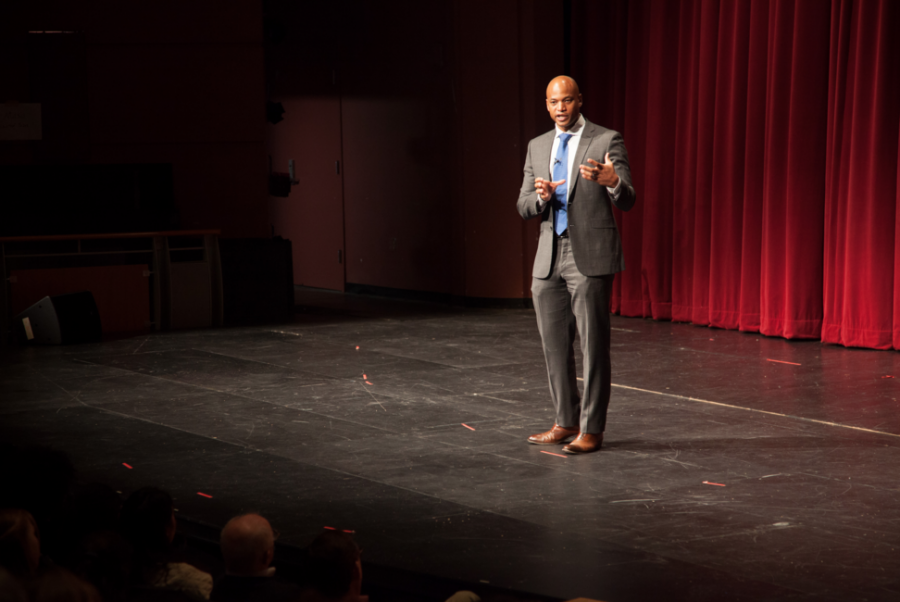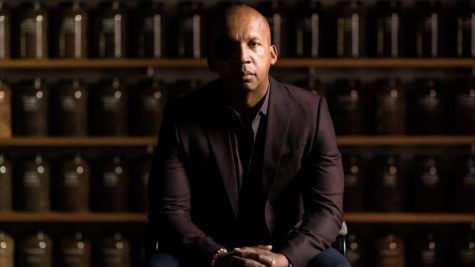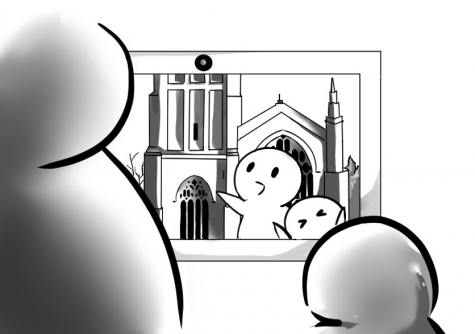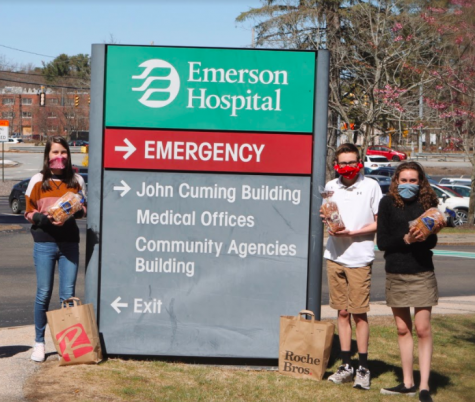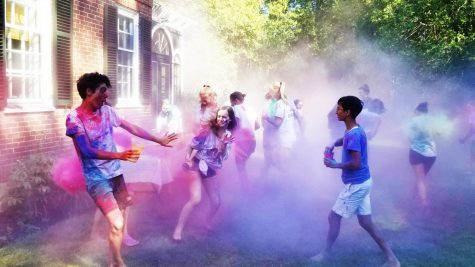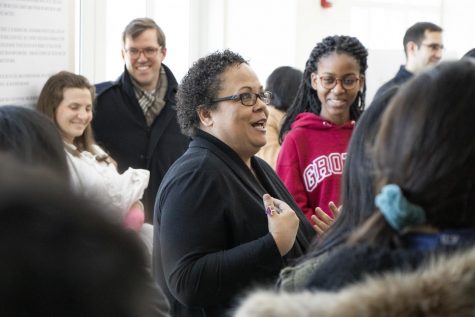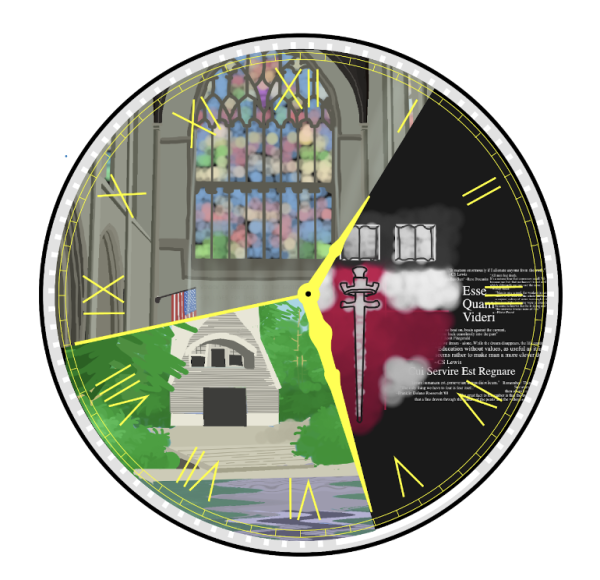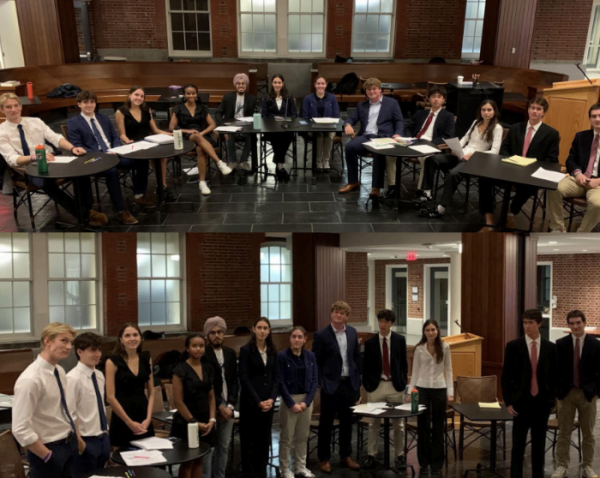Wes Moore Visits the Circle
Author Wes Moore engages the school during his lecture.
In 2013, author Wes Moore introduced himself to the Groton community through his bestselling book The Other Wes Moore, the 2013 allschool read. In commemoration of Martin Luther King Jr. Day this year, Groton invited Moore to the Circle, where he reiterated his heartfelt message of empowerment and the blessing of opportunities.
Moore warmed the hearts of the Groton community, delivering the talk with conviction and passion. He reminded the community of the vitality of making lasting change in communities. He said, “After college, no one’s going to ask you what you majored in at college. That’s all gone. Faded. What’s really important is the question: ‘Who did you choose to fight for?’”
Moore went on to highlight briefly the key points of The Other Wes Moore. He emphasized that the story is not about two boys living in the same district with the same name, but rather the variance of decisions and choices one can make in a given surrounding.
Moore’s energizing ideas and intensity inspired many Groton students. “Like both Weses, I grew up below the poverty line. Like him, I’ve achieved what I have thanks to the support of those around me,” said Macy Lipkin ’18.
“Not everything is about you. The fact that society is full of others—you couldn’t have gotten here by yourself without people loving and supporting you,” said Moore. “When I went off to military academy, I wanted to go back home so badly. I called my mom and told her that I was ready to go back, but then I realized that too many people sacrificed too much for this opportunity.”
Moore further challenged the Groton community to find the “others,” or outcasts, and to accept them. He said, “Voices are completely forgotten about in our conversations until their voices are loud enough that they cannot be ignored.”
Moore’s mission in his work is to inform and “encourage people to think and not tell them what to think.” Dashy Rodriguez ’19 asked the author a simple but jarring question: “I want to help, but where do I begin?” Moore’s response was simply stated: there’s no single answer or solution. Furthermore, he dug deeper into the analogy of educating a child. “Every child is different. Opportunity is not prevalent either. Education is not about a single piece of paper. It’s not about selfish needs or satisfaction. It’s about challenge, push, determination. How do you make higher education impact the world? Education needs to change the individual first,” said Moore. Moore suggested a solution in combatting racial bias: time and exposure.
“There’s one sentence toward the end of Moore’s book that I haven’t forgotten, said Macy Lipkin ’18. “He talks about the luck involved in his admission to Johns Hopkins, and he mentions how pure circumstance kept people from similar backgrounds from the opportunities he was given. He writes, ‘For the rest of us—those who snuck in despite coming from the margins—the mission has to be to pull up others behind us.’ I understand that I wouldn’t be at Groton without sheer good luck, and one of my big goals in life is to help kids who grew up poor like me get what they deserve.”
For others, such as Frances McCreery ’17, the questions Moore answered stayed with her the most. The overall consensus was that Wes’ solutions weren’t overreached; they were overall pragmatic, yet impactful. Moore invited the Groton community to discover and find something that made each individual’s heart beat a little bit faster—something that makes a person get excited and passionate. “When he said that there wasn’t only one way to serve but that for each person is was different and how you should just do whatever makes your heart beat a little faster,” said McCreery ’17 when asked what she thought the highlight was.
Moore drove the talk home by introducing the idea that people are a product of their environments. The expectations that are held in one surrounding are different from those in another. Both Wes Moores met their environmental expectations. “It was mind blowing for someone to come and tell you that you are a product of your environment and its expectations. I wonder where or who I would have been had I lived in another place or born in a completely different family,” said Matt Efros ’15.
“I remember when he said something along the lines of ‘everyone has the potential, but not everyone has the opportunity,” said Nicholas Steinert ’19. “That’s hard to think about, really when you’re given so many opportunities especially at a school like this.”
Moore’s message not only touched the hearts of many, but also presented solutions by which Grotonians could make change in their own communities. “People won’t fight because they are afraid of the consequences. Because it’s more fun to live what way. But the right thing to do is to genuinely impact and change your community because really that’s more interesting,” said Moore.
We will all eventually leave this earth someday. And we all want to be remembered one way or another. Why not effect change by fighting for something? Whom will you fight for?
Lilias bids a warm Canadian welcome from Oakville, Ontario. She has written for the Circle Voice since Second Form and enjoys writing for the News and...


